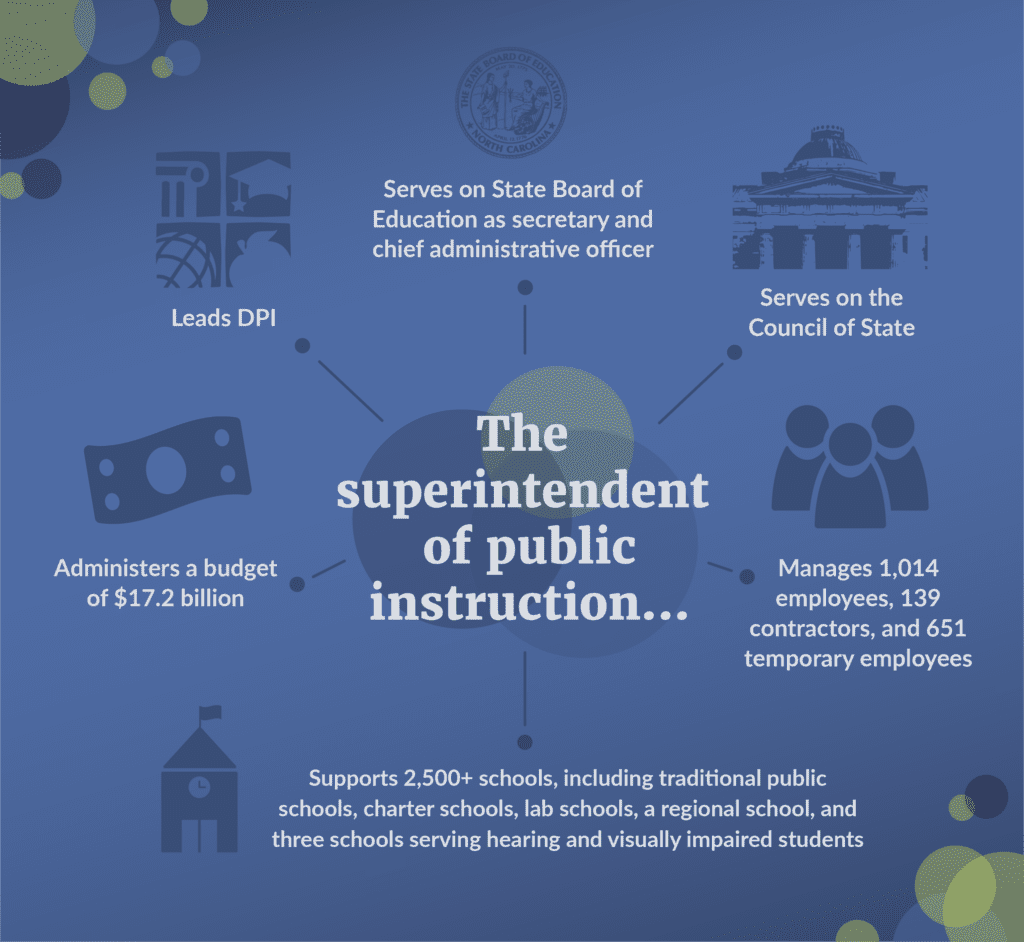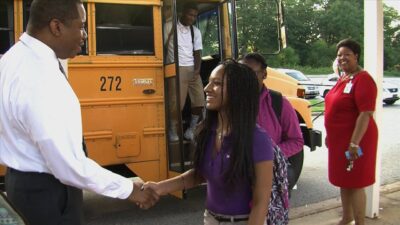
Republican Michele Morrow and Democrat Mo Green, candidates for state superintendent of public instruction, met virtually Thursday for their first debate.
The race has attracted national attention after Morrow, a former nurse and homeschool teacher, unexpectedly won the Republican primary over incumbent superintendent Catherine Truitt. The election Nov. 5 will determine who supports the state’s more than 2,500 public schools and heads the Department of Public Instruction (DPI).
Green, former superintendent of Guilford County Schools, referenced his experience in educational leadership as the basis of both his vision for improving schools and his preparedness for the office.
Morrow argued the opposite — she said her position as an outsider would provide her with an advantage in addressing challenges facing students and educators.
The candidates responded to questions on top education issues: teacher pay, teacher and principal recruitment and retention, early literacy, school performance grades, school choice, attainment, and parent engagement. They also argued for their abilities to lead DPI, administer a budget of $17.2 billion, and unite a variety of stakeholders with differing points of view.
A recording of the full debate is embedded at the bottom of this article. The debate was hosted by BEST NC, a nonpartisan coalition of business leaders focused on education advocacy, and it was moderated by Chris Williams, executive producer of Carolina Business Review.
Read more

Morrow’s opening statement
I am running for superintendent of public instruction because I believe that education is the key to securing a sound future for the state of North Carolina, as well as for our nation. I am a mom of five. I’m a nurse, I am a teacher, and I have been advocating to protect parental rights, to fight to get back to education rather than political agendas, and to protect women in their sports and in their private places, as well as focusing on academics and career preparedness for every student here in North Carolina. I believe that education is the great opportunity maker. It is what lifts families and communities out of poverty, and it is what is going to create the leaders of tomorrow that we are going to need to maintain that North Carolina, the state where we all love, remains safe and prosperous and free.
Green’s opening statement
I am running because I am deeply concerned about a number of things related to our public schools in North Carolina. Certainly the lack of funding, the lack of disrespect [sic] shown to public schools and our public school educators, and the need to improve student achievement. I believe that I certainly have background, having served as superintendent of Guilford County Schools for seven and a half years, and what comes with that is then a vision for our public schools, and that vision is to utilize a quote from Dr. Martin Luther King, Jr: ‘Intelligence plus character. That is the goal of true education.’ And with that vision, we’ve combined it with a focus on excellence. That’s a vision I utilized as superintendent of GCS, which resulted in dramatic increases in graduation rates and the number of students taking and passing college level courses and being recognized as a national district of character.
Background on the candidates
Green served as Guilford superintendent from 2008 to 2015 and then became executive director of the Z. Smith Reynolds Foundation, a philanthropic organization that funds several initiatives, including education-related causes.
“I’ve had tremendous experience in running major, complex educational organizations,” Green said.
He pointed to several efforts under his leadership as examples of the strategies he would use to support educators and improve student outcomes.
For example, Green said the character education initiative he led in Guilford County resulted in the district being recognized as a National District of Character. That meant helping students understand a set of important character traits, and then giving students opportunities for service learning. If elected, he said, he would institute a similar effort statewide.
“We need to make character development equally as important as academic outcomes,” Green said.
Green also said the principal leadership academy created while he led the Guilford schools has served as a model for other parts of the state and should be expanded to prepare strong principals who can support teachers. He pointed to increases in graduation rates and students gaining college credit during his tenure as evidence of his potential in improving student success across the state.
“To utilize a quote from Dr. Martin Luther King Jr., ‘Intelligence plus character — that is the goal of true education,'” Green said. “And with that vision, we combine it with a focus on excellence.”

Morrow, who worked as a nurse before becoming involved in conservative political efforts in recent years, said her role as a parent and an advocate has informed her positions. She homeschools her children and has taught in “microschools,” groups of homeschooled children.
“For the last six years, I have been working as a concerned citizen, traveling the state, hearing the voice and hearing the vision of families and what they desire for their students,” Morrow said. “I am going to be the advocate for the people of North Carolina, and I have already had great success in that just being on the outside. And I’d like to come on the inside and make those changes so that every student in North Carolina gets the opportunity to succeed as adults.”
Morrow’s previous social media posts that called for the execution of public leaders, confirmed her presence at the Jan. 6, 2021, riot at the U.S. Capitol, and suggested that then-President Donald Trump use the military to stay in power have made national headlines. When Green mentioned these comments in the debate, Morrow said the statements have been taken out of context.
The current system’s strategies are not working, Morrow said. She said that achievement is not where it should be, that many teachers do not feel safe, and that trust between educators and parents is broken.
“We all know that systems are designed to protect themselves, and that’s exactly why they have chosen Mr. Green to be their candidate, because they want to protect the system that continues to fail our students, fail our teachers, and fail us as a nation, because we are not giving our children the academic success or the career preparedness that they need.”
Morrow said she has heard, in her political work and her homeschooling, from parents and teachers who are unsatisfied with their children’s educational experiences.
A code of conduct is needed to improve safety in schools, Morrow said, as well as an effort to strengthen communication between educators and parents. She mentioned her support for the Parents’ Bill of Rights, state legislation passed last year that sets certain expectations for parents’ roles in education of their children.
The law also bans curricula on gender identity, sexual activity, or sexuality in kindergarten through fourth grade. It also requires schools to notify parents about their child’s physical and mental health, including any services they receive or changes in students’ pronouns.
“It’s imperative that we make our schools be about scholastics, character development, and career preparedness, rather than political and social agendas and activism,” Morrow said.
School choice
Morrow said that she supports school choice, and that competition among options — such as public charter schools, homeschools, and private schools — will lead to the best outcomes for students.
“Right now, it is absolutely necessary that we have healthy competition in the free market system,” Morrow said. “Competition creates the best product at the best price, and our public school system should be raising the bar so that we can keep everybody in our schools, and we can make people want to be there and to stay.”
She said public schools “should be the absolute best option for every family.”
Green said he also supports choice but does not support the recent expansion of publicly funded vouchers for families to attend private schools.
“Public dollars should go into supporting public schools, that would be traditional public schools and charter schools,” he said. “And let’s be abundantly clear, you’re talking about hundreds of millions of dollars, which will turn into billions of dollars, through this taxpayer-funded private school voucher program, that are being drained away from our public schools, leaving our public schools with not enough resources to do what it is called upon to do.”
A recent analysis from the North Carolina Office of State Budget and Management found that the legislature’s expansion of the vouchers, known as Opportunity Scholarships, would mean nearly $100 million less in public school funding within a year.
Teacher pay, recruitment, and retention
Green cited teacher pay as one of his top strategies to increase teacher retention, focusing specifically on raising base compensation through an educator’s career to at least the national average, if not above it.
Morrow said she would start her superintendency with an audit of DPI’s spending and programs to ensure that the funding is going to its best use and that programs are working to support students. She did not specify the increase in compensation, but said teachers need to be treated as professionals.
“There is no reason why a teacher should have to have a second job, because teaching is probably two jobs in one, or even more,” she said. “Also they should not be having to provide resources in the classroom.”
Any teacher pay raises must be appropriated by the General Assembly.
Morrow said educators need a better working environment where they feel safe and can focus on instruction.
“Our administrators, as I said before, their No. 1 goal needs to be to create a great work and learning environment where the teachers and the students cannot wait to get there in the morning,” she said.
She said she would also expand mentorship for beginning teachers, teacher cadet programs, and advanced teaching roles to recruit and retain teachers.
Early literacy
Both candidates applauded the state’s recent efforts to train K-5 teachers on the science of reading, or how the latest research says students learn to read. And both said those efforts should extend into middle school to help struggling readers in later grades.
Morrow also called for less screen time in early elementary grades in order to improve academic and behavior outcomes.
Green said he would work with institutions of higher education to ensure teachers are adequately prepared to teach reading before entering the classroom, and advocate for more professional development for both existing and new teachers.
Attainment
In 2019, myFutureNC, a coalition of agencies and organizations, set the state’s first attainment goal: having 2 million North Carolinians with a high-quality credential or postsecondary degree by 2030.
Green said that exposure to higher-level math and reading courses in middle school is important to give all children opportunities to succeed in high school. He also said ensuring high schoolers have access to college-level courses — a focus he had in Guilford County — also would help students prepare for postsecondary success.
“I do believe that we have to be sure that we have expectations at a higher level for all of our students,” he said. “Our students are incredible. We just need to be sure that they can meet the level of expectation that we set for them.”
Both candidates called for expanding CTE (career and technical education) opportunities to students who might be interested in pathways other than college after high school.
Morrow referenced the state’s percentage of 18-to-24-year-olds enrolled in a postsecondary institution in 2022: 38%.
“What are we doing for the other 62% to ensure that they can step right off of their graduation stage, and they can enter into careers that are going to make them not only financially independent, but also are going to be rewarding, and potentially be able to raise a family in the very town where they were born and raised? I think that should be the goal.”
Parent engagement
Morrow emphasized a disconnect between educators and parents. She said administrators need a heavier role in helping educators communicate with parents.
“They’re often having worse encounters with the parents than they are with the students,” she said. “We have to change that, and we need to make every school be an area of opportunity and a place in the community where people feel safe, they feel listened to, and we are uniting people.”
Green said overall that educators and parents are working well together.
“This idea that you’ve got to create some legislation to do that is really a false narrative,” he said. “Are there individual situations that could be improved? Absolutely. That is true of every organization.”
Green suggested opportunities for deeper engagement like a parent academy model he implemented in Guilford County. He said it invited parents to partner with teachers and better understand their role in their child’s learning.
“The role of the parent is critically important to the educational opportunities for their children,” Green said.
School performance grades
The candidates disagreed about what measures the state should use to hold schools accountable.
The current A-F grading system weighs academic achievement at 80% and students’ growth from year to year at 20%. Green said that equation should change.
“A school that is actually making expected growth with its students could still find itself with a very low grade,” Green said. “I don’t think that that is very instructive to the educators, nor the parents, nor the broader community.”
Morrow pushed back on rewarding growth.
“We are not doing any child a favor if they are in fifth grade and they’re reading at a second-grade level and they move up to the third-grade level, and we move them on to sixth grade,” she said.
More debates to come
Friday morning, Green and Morrow will participate in a discussion at the LatinxEd Summit in Winston-Salem. The debate will be moderated by 2022 N.C. Beginning Teacher of the Year Xavier Adams.
NC PTA and Public Schools First NC are hosting a candidate discussion on Saturday at 10 a.m., moderated by Jeff Tiberii. Here is more information on how to register to watch online.
Spectrum News 1 and the N.C. Institute of Political Leadership are hosting a televised debate with the candidates on Tuesday, Sept. 24 at 7 p.m.
Next month, Moore County Schools is hosting a debate at Pinecrest High School between the candidates as well. The event will take place on Oct. 14 and is expected to be televised by WRAL.
The full debate
Watch the full debate below.
Editor’s note: The Z. Smith Reynolds Foundation supports the work of EdNC. Chris William and Mo Green previously served on the board of EdNC.
Behind the Story
EdNC’s Caroline Parker produced the audio story accompanying this article.






